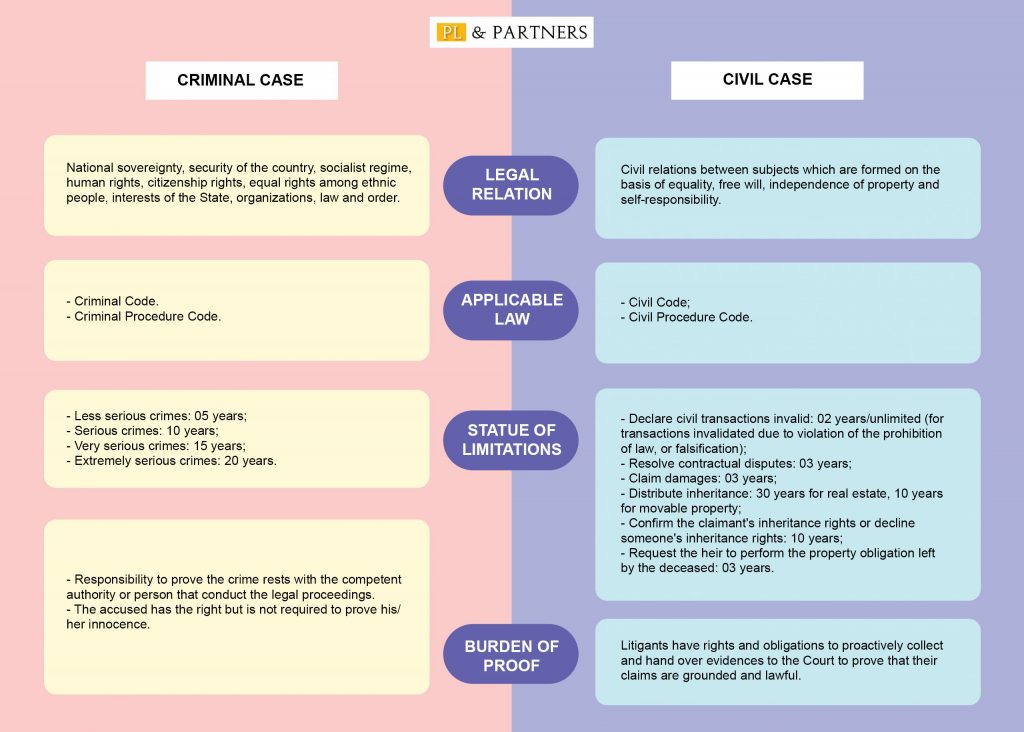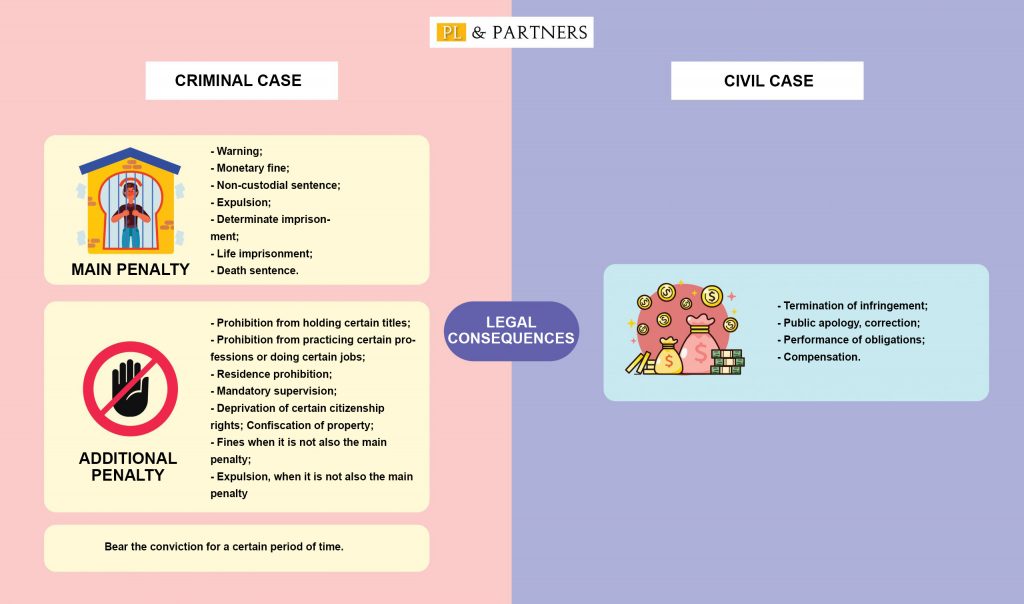In settling civil disputes or resolving criminal cases, determining the nature of the case is indispensable. Determining whether a case will be governed by civil law or criminal law still confuses many people. Therefore, PL & Partners Law Firm would like to compare some of their outstanding features to distinguish between civil cases and criminal cases.
1. VIOLATED LEGAL RELATIONS, APPLICABLE LAWS, AND STATUTE OF LIMITATIONS.
1.1. Violated legal relations in civil cases disputing at the Court and criminal cases.
For criminal cases, they are national sovereignty, security of the country, socialist regime, human rights, citizenship rights, equal rights among ethnic people, interests of the State, organizations, law and order.
For civil cases, they are civil relations between subjects which are formed on the basis of equality, free will, independence of property and self-responsibility.
1.2. Applicable laws.
- Criminal cases: Penal Code, Criminal Procedure Code.
- Civil cases: Civil Code, Civil Procedure Code.
1.3. Statute of limitations.
The statute of limitations for criminal prosecution:
- Less serious crimes: 05 years;
- Serious crimes: 10 years;
- Very serious crimes: 15 years;
- Extremely serious crimes: 20 years.
The statute of limitations for initiating a civil lawsuit to:
- Declare civil transactions invalid: 02 years/unlimited (for transactions invalidated due to violation of the prohibition of law, or falsification);
- Resolve contractual disputes: 03 years;
- Claim damages: 03 years;
- Distribute inheritance: 30 years for real estate, 10 years for movable property;
- Confirm the claimant’s inheritance rights or decline someone’s inheritance rights: 10 years;
- Request the heir to perform the property obligation left by the deceased: 03 years.

2. BURDEN OF PROOF OF PARTICIPANTS IN LEGAL PROCEEDINGS.
For criminal cases, the responsibility to prove the crime rests with the competent authority or person that conduct the legal proceedings. The accused has the right but is not required to prove his/ her innocence.
For civil cases, litigants have the right and obligation to proactively collect and hand over evidences to the Court and prove that their claims are grounded and lawful. Agencies, organizations and individuals that initiate lawsuits or request to protect the legitimate rights and interests of others have the right and obligation to collect and provide evidence and the burden of proof as the litigant.
3. DEFENSE COUNSEL IN CRIMINAL CASES, PROTECTOR OF LEGITIMATE RIGHTS AND INTERESTS OF LITIGANTS IN CIVIL DISPUTE SETTLEMENT AT COURT.
3.1. Advocate.
The striking difference between a criminal case and a civil case is the presence of a defense counsel in a criminal case. The role of the defense counsel is to present circumstances that prove the innocence of the accused, mitigation of criminal liabilities of the accused and to assist the accused with respects to legal matters to protect their legitimate rights and interests. This shows the fairness of the law.
According to the law, the accused, their representatives or relatives will invite or the competent authority that conduct legal proceedings shall appoint the following persons as defense counsels:
- Lawyers;
- The accused’s representative;
- Advocate;
- Legal aid officiers in case the accused person is subject to legal aid.
If the appointed defense counsel is absent, the Trial Panel must postpone the court session, unless the defendant or the defendant’s representative agrees to conduct the trial without advocate’s presence.
3.2. Protector of legitimate rights and interests of litigants in civil dispute settlement at court.
In civil dispute resolution at the Court, the protector of the plaintiff or the defendant is called the protector of legitimate rights and interests of litigants. This person could be: an attorney; legal aid officier or participants in legal aid; the representative of the representative organization of employees (protect the worker); or Vietnamese citizens with full capacity for civil act and in accordance with the law.
This subject is also present in criminal cases with the role of protecting the rights and interests of the victim. The subjects who can participate in this role are: lawyers, representatives, advocates, legal aid officiers.
4. LEGAL CONSEQUENCES, COURT FEES AND OBLIGATIONS TO PAY THE COURT FEE.
4.1. Legal consequences.
Legal consequences in criminal cases are implemented for the purpose of punishing, educating and deterring offenders. Therefore, the offender after being judged will be subject to one or more certain punishments. The court may simultaneously impose one of the following main penalties and additional penalties (if any) on the offender:
Main penalties include warning; monetary fine; non-custodial sentence; expulsion; determinate imprisonment; life imprisonment; death sentence.
Additional penalties include: prohibition from holding certain titles, or practicing certain professions or doing certain jobs; residence prohibition; mandatory supervision; Deprivation of certain citizenship rights; Confiscation of property; Fines when it is not also the main penalty; Expulsion, when it is not also the main penalty.
After serving the sentence, the convict shall bear the conviction for a certain period of time.
For civil matters to be settled together with criminal cases, the civil defendants must compensate the victims and the civil plaintiffs.
On the other hand, in the settlement of a civil dispute at the Court, also known as a civil case, the main purpose of the petitioner is to gain legitimate rights and be compensated for damages, and be remedied the consequences of the damage caused by the defendant. Because of this nature, in civil cases, the losing party is forced to perform one of the following obligations:
- Termination of infringement;
- Public apology, correction;
- Performance of obligations;
- Compensation.
4.2. Obligation to bear court fees in civil disputes and criminal cases.
Court fees are also a matter of concern. For criminal cases, the court fees are borne by the convict, the victim, etc. in accordance with the law. As for civil cases, litigants must bear first-instance fees for their claims that are not accepted by the courts, except for cases where they are exempt from or are not required to bear first-instance fees or otherwise prescribed by law.
The above are some characteristics to help readers easily distinguish between criminal cases and civil cases.

In case you would like to subscribe for our services or want to make questions, concerns about our services,
PL AND PARTNERS LAW FIRM
Headquarters: 46th Floor, Bitexco Financial Tower, No. 2 Hai Trieu, Ben Nghe Ward, District 1, Ho Chi Minh City, Vietnam
Office: Lot 1.16 Viva Riverside, 1472 Vo Van Kiet, Ward 3, District 6, HCMC
Hotline: 093.1111.060
Email: info@pl-partners.vn
Facebook: www.facebook.com/PLLaw
Website: www.PL-PARTNERS.vn – www.HOIDAPLUAT.net – www.THUTUCPHAPLY.org
We are always ready to assist you.










